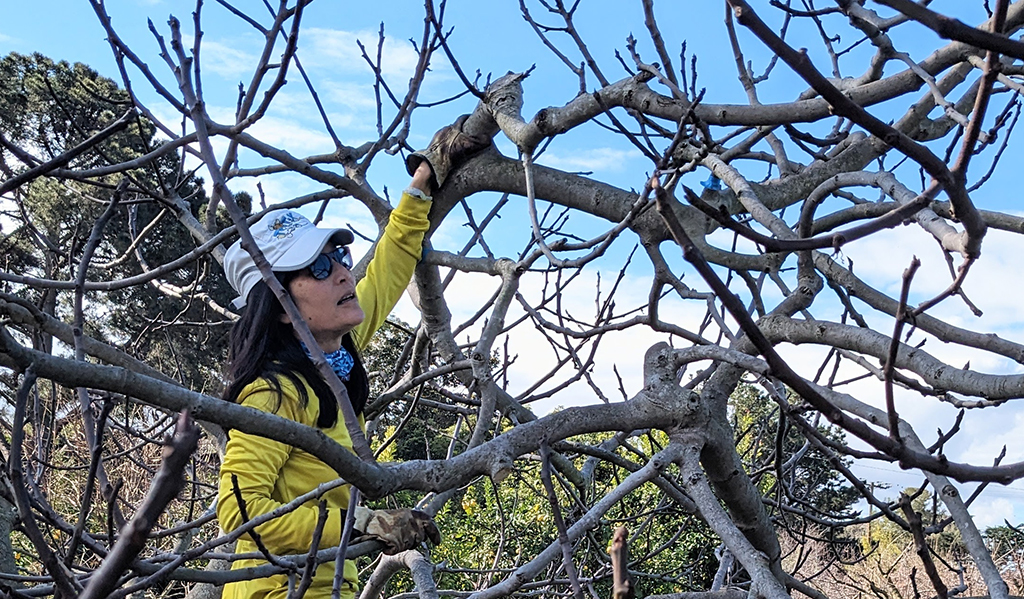by Marla Koss

Michi Lee Pruning in Farm2Market’s orchard, February 2024
What classifies a tree as “hardwood” as opposed to “softwood”? How do evergreen (trees that keep their leaves year-round) and deciduous (trees that lose their leaves in the fall, go into dormancy over the winter, and leaf out again in the spring) trees differ in their behavior or needs, and which fruit trees are which? Unless you majored in botany or are a bona-fide ‘tree-whisperer’, there may be a gap or two in your knowledge base. So take this little quiz to discover how much you know!
- Fig, pomegranate and persimmon trees are classified as evergreen. True/False
- All fruit and nut trees are classified as hardwood. True/False
- Evergreen fruit trees such as citrus require more winter water than deciduous fruit trees. True/False
- Deciduous fruit trees benefit more from a year-round sunny location in the Alameda garden than evergreen fruit trees do. True/False
- Evergreen fruit trees can be fertilized year-round. True/False
- Evergreen fruit trees are better able to resist winter cold than deciduous trees. True/False
- According to the WUCOLS (Water Use Classification of Landscape Species) database, fig trees growing in Alameda need more water than apricot trees do. True/False
Answers
- False. They are all deciduous trees. Ergo the glorious shows that persimmon trees put on in the fall before leaf drop, and afterwards when fruit may still hang on the tree. Examples of deciduous trees you’re likely to see in local yards include apples, pears, plums, apricots, peaches, nectarines, persimmons, figs, quinces and pomegranates. Evergreen fruit trees we can grow in Alameda: avocados, feijoas (pineapple guavas), citrus, loquats and olives.

Persimmon foliage in November
- True. The classification of “hardwood” and “softwood” can be a bit misleading. Hardwoods are defined as angiosperms, which flower and have enclosed seeds (walnuts, peaches, etc.). Also known as Broadleaf trees. Softwoods are trees that shed seeds without coverings, so are classified as Gymnosperms (naked seeds). Think pine cones and those little pine nuts that come flying out of them and land on the shelves at Trader Joe’s for the price of a King’s Ransom. Most, but not all, hardwood trees are deciduous (olives are classified as evergreen, yet it’s a hardwood and its wood is 3 times as hard as oak). The wood of hardwood trees has more wood cells and less air per square inch than the wood of softwood trees. The misleading part comes when you find out that Balsa wood, that stuff you got to make toy boats out of at summer camp, is classified as a hardwood, because it, too, is an angiosperm (granted, it IS the softest hardwood available). Note to Ken Jennings: this would make a great final answer on Jeopardy!

Hardwood logs breaking down
- True. Evergreen fruit trees continue to move through different states of bud growth, blossoming and/or fruit formation year-round, so are more sensitive to winter drought than deciduous fruit trees, which can withstand less water through the winter months because they are dormant.

Pomelo tree in blossom
- False. In Alameda, deciduous fruit trees may not always get the winter chill that they require, and can be helped along by being planted in parts of the garden with winter shade AND summer sun. Evergreens like citrus enjoy soaking up the rays year-round.

California Honey mandarins in the winter sun
- True. Evergreen fruit trees will respond to fertilizing during any season, since their buds never go into a rest period and respond to stimuli. The level of response, however, may make a difference based on seasonal temperatures and availability of water (i.e., a cold, rainless winter and no supplementary irrigation = minimal positive results). Deciduous trees don’t take up nutrients while dormant, so don’t bother spreading out a complete fertilizer at this time. The only exception to this is compost or worm castings, which are not “complete” fertilizers, but benefit the surrounding food web in the soil and safeguard the root zone’s health no matter the season.

A complete Citrus fertilizer gives citrus trees micro-as well as macronutrients
- False. Evergreen fruit trees aren’t able to take advantage of the protective nature of winter dormancy that deciduous trees have built-in (dormancy allows deciduous trees to withstand less water and colder winter temperatures).

Winter cold does not bother dormant deciduous trees like this Purple-Leaf Plum.
- True. The WUCOLS (Water Use Classifications of Landscape Species) Plant Search list at waterwonk.us puts some backyard favorites like persimmons, peaches, apricots, nectarines and plums in the “low-water” category, as opposed to edible figs, which are considered moderate water. You’ll also find apples on the moderate water list, as well as blueberries (well, no surprise there, really). But this plant search list is super-useful if you need to figure out the water needs of something you’d like to plant in your yard (or is already there and you’re wondering if it’s getting the right amount of irrigation). Otherwise, it’s a fascinating trip down the rabbit hole if you’ve got the time.

According to WUCOLS, apricot trees need less water than fig trees







